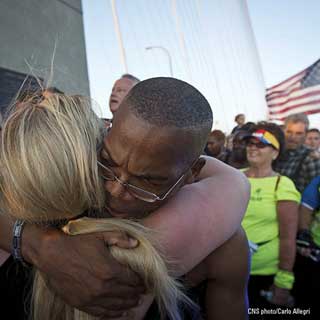The Word from Lansing: Love & Peace in the Midst of Violence

Posted August 19, 2016
In response to increasing acts of violence, Americans witness and experience a range of emotions. Fear, sadness, anger, and mistrust are strongly felt in communities across the country. Each time news emerges of another shooting, whether against law enforcement officers or against civilians, we struggle to process what happened and how to respond. In July, the president of the U.S. Conference of Catholic Bishops (USCCB), Archbishop Joseph Kurtz, wrote, “People are suffering because their uniform is blue, suffering because their skin is black and suffering simply because of their station in life.” In light of this suffering, it is important to look at what can be done to promote peace, address racial tensions, and create a culture that values all people.
In 1994, the U.S. bishops wrote “the starting point for confronting a culture of violence” is fostering a respect for all human life. That statement is still as true today as it was then. The Catholic Church has long spoken out for the dignity of all people, including the unborn, the elderly, and the disabled, who are made in the image and likeness of God. Pope Francis, too, has called for individuals to “seek for others the same possibilities which we seek for ourselves” (Address to U.S. Congress, 2015). To highlight the dignity of every person, Catholics are called to speak out against violence, including gun violence, emphasizing instead the need for dialogue and respect.
In response to last month’s shootings in Minnesota, Louisiana, and Texas, the USCCB announced September 9, 2016 as a Day of Prayer for Peace. The day also celebrates St. Peter Claver, a Spanish saint who is known for his care of African slaves. His example, advocating against the slave trade and encouraging the humane treatment of slaves, teaches that we too can listen to the needs of others and help their voice to be heard. Racial tensions and violence are not issues for a small few, but ones for all to work on together.
The U.S. bishops have also created a task force, led by Archbishop Wilton Gregory of Atlanta. This group will engage on critical issues such as race relations, economic opportunity, restorative justice, mental health, and gun violence, among others. The committee will be listening to community needs, developing relationships to help prevent conflicts, and advising bishops on best practices. These conversations are difficult — yet necessary — especially during an election season desperately in need of civility and understanding. The message of the Catholic faith reminds us to be people of action and of hope for others, bringing the value of all human life to political conversations.
Confronting violence and creating more inclusive communities takes work: promoting neighborhood watch groups, community-oriented policing, and partnerships between law enforcement and the local faith community; addressing root causes of crime; forming relationships with those of different backgrounds; and examining our own attitudes and their impact on violence in society (USCCB: Responsibility, Rehabilitation, and Restoration, 2000; Confronting a Culture of Violence, 1994).
There are no easy answers, but Catholics can play a role in transforming fear, sadness, anger, and mistrust in our communities into hope, understanding, compassion, and love. The question is, are we ready?
